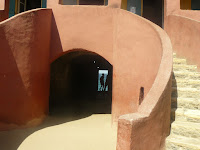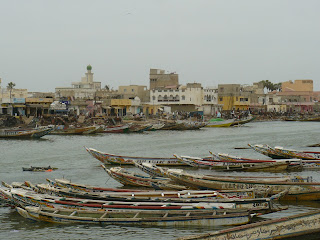We
arrived in Cahuita, a small town with a Caribbean flavour, on the local bus.
The highlight here was the snorkelling. My daughter wouldn’t let me pussyfoot
around and took me far beyond my timid forays off the boat. The reward was well
worth my former conviction that I would die a watery death. ‘The best thing about my country,’ said our fixer,
Ron, ‘is you can swim in the Atlantic in the morning and the Pacific in the
afternoon.’ He was right but we had other places to see before we hit the
Pacific rollers.
Sarapiqui was our next call where we learned why it’s called rain forest. It wasn’t a time to stay indoors reading though; we wanted to see the forest’s flora and fauna. The rain had brought out tiny frogs by the dozen. ‘Don’t pick up these red ones,’ warned our guide displaying one on his hand. ‘They’re poisonous.’
 Another bus journey took us to Arenal with
its conical volcano hiding its head in the clouds. Here we ate at local
restaurants, one of which boasted an impressive array of books for swapping.
They were, of course, in Spanish but Maria, Ron’s 14 year old daughter, told me
people loved to read English books too.
Another bus journey took us to Arenal with
its conical volcano hiding its head in the clouds. Here we ate at local
restaurants, one of which boasted an impressive array of books for swapping.
They were, of course, in Spanish but Maria, Ron’s 14 year old daughter, told me
people loved to read English books too.‘I’ve read all but the last one of Harry Potter,’ she said. I didn’t happen to have the missing copy on me but I left the paperback I’d just finished on the shelf instead. I obviously wasn’t the first visitor to do so. There were a couple of English language copies of Michael Crichton’s Jurassic Park, and The Lost World which are set in a fictitious Costa Rican island.
 After exploring Arenal and clambering over
large chunks of volcanic rock a fair way up the volcano, we headed off the
Monteverde Cloud Forest. Here, in spite of the whole town being a tourist
resort, you can see virgin forest for miles. They take conservation seriously
so certain areas have limits on the number of visitors per day.
After exploring Arenal and clambering over
large chunks of volcanic rock a fair way up the volcano, we headed off the
Monteverde Cloud Forest. Here, in spite of the whole town being a tourist
resort, you can see virgin forest for miles. They take conservation seriously
so certain areas have limits on the number of visitors per day. Costa Rica was once at least 75% forest but
by the 80s this has been depleted to around 25% or lower according to some
estimates. Reforestation schemes have restored this to some degree and it’s now
just over 50%. This provides natural habitat for its incredible 500,000
wildlife species including jaguars. We heard plenty of howler monkeys and saw
white-headed capuchins, who outwitted tourists by working in groups. While one
posed for photos, others nipped to the tourists’ bags to steal food.
Costa Rica was once at least 75% forest but
by the 80s this has been depleted to around 25% or lower according to some
estimates. Reforestation schemes have restored this to some degree and it’s now
just over 50%. This provides natural habitat for its incredible 500,000
wildlife species including jaguars. We heard plenty of howler monkeys and saw
white-headed capuchins, who outwitted tourists by working in groups. While one
posed for photos, others nipped to the tourists’ bags to steal food. Coatis would
also investigate tourist groups for handouts. Sloths, some curled up in the
high tree-tops, others making their way slowly, slowly up and down trees or
even across telephone wires in the town, were a never-ending delight. Costa
Rica is a paradise for ornithologists with its numerous bird species, from
toucans to jewel-coloured hummingbirds and we were lucky enough to see several
beautiful, but rare, Resplendent Quetzals.
Coatis would
also investigate tourist groups for handouts. Sloths, some curled up in the
high tree-tops, others making their way slowly, slowly up and down trees or
even across telephone wires in the town, were a never-ending delight. Costa
Rica is a paradise for ornithologists with its numerous bird species, from
toucans to jewel-coloured hummingbirds and we were lucky enough to see several
beautiful, but rare, Resplendent Quetzals. Zip-lining over the forest canopy was thrilling
but we were so busy concentrating on controlling our speed on the zip-lines we
couldn’t always appreciate the stunning panorama beneath. A more leisurely walk
over the canopy bridges gave a detailed view of the forest’s wonderful diversity.
Zip-lining over the forest canopy was thrilling
but we were so busy concentrating on controlling our speed on the zip-lines we
couldn’t always appreciate the stunning panorama beneath. A more leisurely walk
over the canopy bridges gave a detailed view of the forest’s wonderful diversity.
Finally we reached the Manuel Antonio National
Park on the Pacific coast where the mighty rollers rolled. You need to be a
strong swimmer to brave them so I sat in the shallows for three minutes before
heading back to the beach while my daughter scared me to death, disappearing
beneath the waves for what seemed hours on end. I had a book with me but I
couldn’t read it as I was too busy peering at the ocean.
‘Costa Rica doesn’t have a very long tradition of literature, not like Britain,’ Maria told me. ‘It doesn’t go back much before the beginning of the last century. We’ve learned that there are five generations of literature but I can’t remember them all. From the 1960s it was the Urban Generation. Then from the 80s it’s The Generation of Disenchantment. The phases relate to our country’s politics and the recent one reflects a lot of dissatisfaction. I think the Urban Generation was the most interesting, that’s the one I want to study. We also read lots of books from other South American writers.’
I asked if she knew of any books that had been translated into English. ‘Cadence of the Moon, it’s a gruesome murder mystery based on a true story,’ said Maria. ‘It’s by Oscar Núñez Olivas, but my dad won’t let me read it.’
Thank you to Lindsay for sharing with us this amazing trip, I am a huge fan of coatis after sharing a hotel with them in Mexico!
About Lindsay Bamfield
Lindsay Bamfield has written a number of short stories and flash fiction pieces as well as non-fiction articles. She has been published in Hysteria 6 Anthology, Stories for Homes 2, Greenacre Writers Anthology, Mslexia, Writers’ News and Writing Magazine as well as on several websites. Prizes include Hysteria 2017, Great British Write Off 2106 and Words with Jam competitions.
She blogs on www.lindsaybamfield.blogspot.co.uk and is on Twitter @LindsayBamfield.










